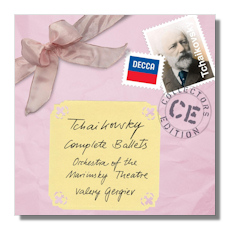
The Internet's Premier Classical Music Source
Related Links
- Tchaikovsky Reviews
- Latest Reviews
- More Reviews
-
By Composer
-
Collections
DVD & Blu-ray
Books
Concert Reviews
Articles/Interviews
Software
Audio
Search Amazon
Recommended Links
Site News
 CD Review
CD Review
Piotr Ilyitch Tchaikovsky

Complete Ballets
- Swan Lake, Op. 20
- The Sleeping Beauty, Op. 66
- The Nutcracker, Op. 71
Mariinsky Theatre Orchestra/Valery Gergiev
Decca 4784273 6CDs DDD
A box grouping the ballets of Piotr Tchaikovsky may not be particularly original, but this Decca reissue of Swan Lake, The Sleeping Beauty and The Nutcracker performed by the Mariinsky Theatre Orchestra under Valery Gergiev nonetheless requires extra attention. The new liner notes by Julian Haylock coming with the set fail to remind us that these ballets were either created for St. Peterburg's Mariinsky or made famous by that theatre and to this day never left its repertory. Both The Sleeping Beauty and The Nutcracker were commissioned by the Russian Imperial Theatres and premiered on the Mariinsky stage, respectively in 1890 and 1892. Swan Lake was premiered and flopped in Moscow in 1877, but was revived after Tchaikovsky's dead by his brother, Marius Petipa and Lev Ivanov in 1895 at the Mariinsky to become the success it still is in theatres around the world. In short, the musicians performing here are continuing a tradition started and groomed by their predecessors for over a century.
It took Valery Gergiev and his orchestra almost fifteen years to complete the Tchaikovsky ballet trilogy. The Sleeping Beauty dates from 1992 when Gergiev was merely artistic director of the Mariinsky Opera and in fact still little known in the music world. When The Nutcracker followed in 1998 he was already heading the whole theatre and had become one of the most acclaimed maestros worldwide. Swan Lake completed the set in 2006. Not surprisingly the sound quality but also the performance standards vary. Beauty and Nutcracker were recorded by Philips while Swan Lake was a Decca release, coinciding with a live performance of the ballet released on DVD.
The Sleeping Beauty which is probably Gergiev's most successful of the three is, alas, also the least well recorded. It was one of the earlier attempts of the Philips engineers at the Mariinsky Theatre before they completely mastered its acoustics. While they secured plenty of detail and dynamic range, the sound remains constricted, "boxy" as if recorded in the orchestra pit, and bass heavy. The performance however is in a class of its own, one of the very best modern accounts around, with Gergiev taking a symphonic approach and dynamizing this fabulous score as only he could in those days. Some of his tempos are quite wild but the Mariinsky Orchestra responds with total engagement, elegance and some stunning solo work. Unlike in some of his later recordings, including Swan Lake featured here, Gergiev's ear for detail and polyphony never obscures the broad lines.
Gergiev's Nutcracker continued in that same vein and with first-rate sonics to boast (incidentally, recorded at the Baden-Baden Festspielhaus rather than the Mariinsky), it also remains one of his best-ever discs. At the time of its release it was hyped as the first full-length Nutcracker on a single CD instead of the usual two. It says something about Gergiev's tempos and virtually non-stop approach. To an even bigger degree than with his Sleeping Beauty, Gergiev is looking forward, turning with the often ferocious energy he finds in the score as much as by Tchaikovsky's inventive orchestration The Nutcracker into a blueprint of Igor Stravinsky. It is an essentially Russian approach, stressing the darkness of the tale and the corresponding ambiguity of Tchaikovsky's music to the hilt, in contrast to the cozier, sugarcoated and family-friendly interpretation usually found in the western Nutcrackers.
After these two superb renderings, Gergiev's Swan Lake is a disappointment. First of all we are considering here the Mariinsky Theatre's performing version, including the reordering and edits by Riccardo Drigo made for the 1895 revival. To potential buyers Decca remains rather laconic about this important difference (an intervention that left over 2,150 bars of the original score on the cutting-room floor), only mentioning this in small fonts on the back of the box. And while this version may work fine in the theatre, it doesn't go down as well on disc. Moreover, with a score this much connected to a theatrical performance Gergiev's symphonic reading only works intermittently and his Swan Lake lacks the dramatic coherence he achieved so brilliantly in the earlier ballets. The playing of the Mariinsky Theatre Orchestra is nonetheless agreeably refined, with some remarkable woodwinds and violin solos, even if it all sounds more routine-like and definitely misses the edge of the previous discs. The recording here is vivid and warm, with a splendid dynamic range, although the brass and percussion could ideally have been balanced more forwardly.
This box offers nearly six hours of some of the greatest ballet music ever composed. If it wasn't for the less than ideal Swan Lake, this set would easily be a prime choice. Still, it comes at a very competitive price and to hear the Orchestra of the Mariinsky Theatre in this, in "their" repertory, is never anything less than a delight.
Copyright © 2012, Marc Haegeman





















